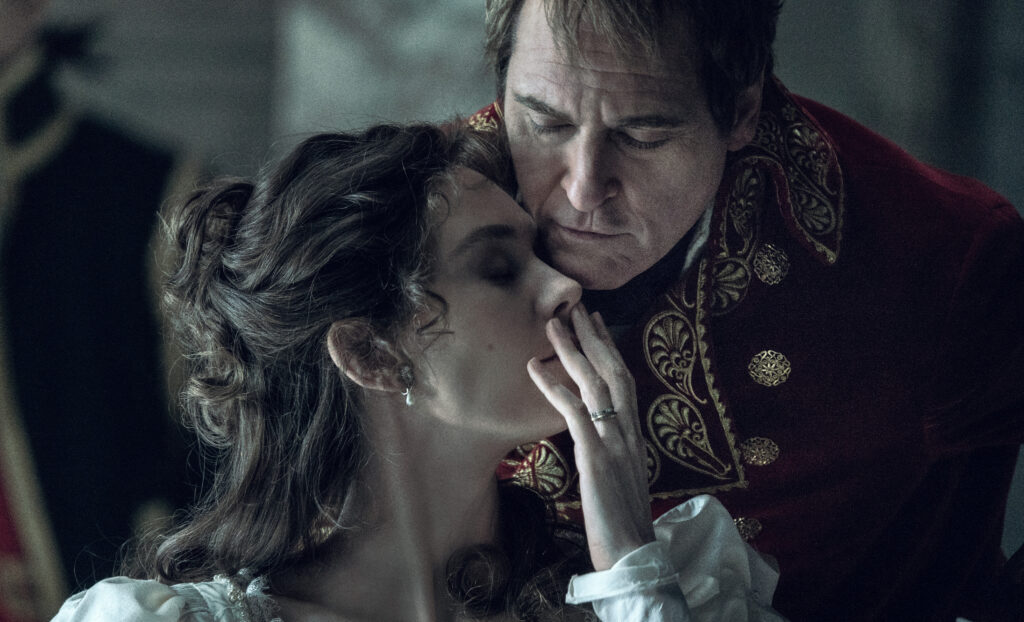action, drama, Joaquin Phoenix, Matthew Needham, movies, Napoleon, Napoleon Bonaparte, reviews, Ridley Scott, Rupert Everett, Sinead Cusack, Tahar Rahim, Vanessa Kirby
November 15, 2023
by Carla Hay

Directed by Ridley Scott
Culture Representation: Taking place in various countries in Europe from 1789 to 1815, the dramatic film “Napoleon” (a biopic of French emperor Napoleon Bonaparte) features a predominantly white cast of characters (with a few black people) representing the working-class, middle-class and wealthy.
Culture Clash: Napoleon Bonaparte rises from humble beginnings to become emperor of France, but his life is plagued by power struggles, marital problems, and deep insecurities.
Culture Audience: “Napoleon” will appeal primarily to people who are fans of star Joaquin Phoenix, director Ridley Scott and history-influenced war movies that put more importance on battlefield scenes than crafting compelling stories.

The long-winded “Napoleon” is a film that acts as if epic battle scenes are enough to make a great war movie. Overrated director Ridley Scott continues his awful tendency of shaming female sexuality more than male sexuality. Napoleon has an American accent. Historical inaccuracies aside—and there are plenty of these inaccuracies in the movie—”Napoleon” (which clocks in at a too-long 158 minutes) is ultimately a very superficial film that is more style than substance.
Although people can agree that “Napoleon” star Joaquin Phoenix is a very talented actor, there’s no legitimate reason for why he has an American accent in portraying a well-known French leader such as Napoleon Bonaparte, when all the other “Napoleon” cast members portraying French people do not have American accents. (They have British accents.) It wouldn’t have been that hard for “Napoleon” director Scott to require Phoenix to not have this phony-sounding and distracting American accent in this movie and instead have Phoenix be consistent with the other cast members’ accents for those portraying French people. It’s just lazy filmmaking, albeit on a very big budget for this overpriced film.
“Napoleon” takes place from 1789 to 1815. He was emperor of France from 1804 to 1814 and part of 1815. Napoleon died in 1821, at the age of 51. The movie has some moments of unexpected comedy, but a lot of that comedy is unintentional. Many lines of dialogue in the uneven “Napoleon” screenplay (written by David Scarpa) are so cringeworthy, they’re funny—as in, viewers will laugh at the dialogue, not laugh with it. The relationships in the movie are presented as very shallow, with poorly written conversations as flimsy substitutes for what are supposed to be meaningful emotional bonds.
As an example of the type of junk that viewers have to sit through when watching “Napoleon,” there’s a scene where quarrelling spouses Napoleon and Josephine (played by Vanessa Kirby) have one of their many arguments during a meal at a dinner party in their palatial home. Josephine calls Napoleon “fat” in front of their guests. Napoleon replies, “I enjoy my meals. Destiny has brought me here. Destiny has brought me this lamb chop!”
Napoleon’s courtship and subsequent marriage to Josephine are portrayed as fueled primarily by lust on his part (and his desire for her to give birth to a male heir) and desperate gold digging and social climbing on her part. Napoleon met Josephine after she was released from prison and essentially destitute. Napoleon gets Josephine’s attention when he sees her playing cards at a dingy nightclub and stares at her like a stalker. Their relationship in the movie consists of a few robotic-like sex scenes and more scenes of them having a dysfunctional and twisted rapport of insulting each other.
“Napoleon” makes it clear that petulant Napoleon and manipulative Josephine got some kind of sexual arousal from their war of words/verbal abuse, where each tried to assert control and dominance over the other. Very little is shown about how Josephine and Napoleon were as parents. Kirby and Phoenix give very capable performances, but neither performance rises to the level of outstanding, due to the substandard screenplay and the bloated direction for “Napoleon.”
Napoleon and Josephine were both admittedly unfaithful to each other during their marriage, but Josephine’s infidelities are repeatedly shown on screen, while Napoleon’s infidelities are not shown on screen and almost excused. The overwhelming sexist tone of this movie is that Napoleon deserved more sympathy for being cheated on, while Josephine is portrayed as a heartless “harlot” who deserved very little or no sympathy. It can’t be blamed on sexism in the 1700s and 1800s. “Napoleon” director Scott made the choices on what to show and what not to show in this movie.
Even though he is an unfaithful husband, Napoleon hypocritically thinks that he’s entitled to his infidelities, while Josephine gets no such entitlement. Napoleon’s jealousy goes beyond the norm and crosses the line into obsessive possessiveness. A scene in the movie shows Napoleon abruptly leaving his military duties on the battlefield to go home to Paris, to show Josephine that he “owns” her, after he hears that she has another lover. When Napoleon is later asked why he made such a sudden (and temporary) departure from his military command, Napoleon replies: “My wife is a slut.”
Napoleon was famous for his abrasive and cocky personality in real life. In this movie, Phoenix depicts not only that unlikeable side to Napoleon but also portrays Napoleon as an emotionally wounded man-child whose feelings get hurt if Josephine doesn’t act as if she’s a submissive wife who worships him. When Josephine doesn’t get pregnant as fast as he wants her to get pregnant, Napoleon blames her and acts personally offended that her body is not conceiving and delivering the heirs that he wants in the timetable he expects them to be born.
Napoleon’s family members are side characters who ultimately exist to react to his ego and whims. Napoleon’s younger brother Lucien Bonaparte (played by Matthew Needham) benefits from Napoleon’s political power. For a while, Lucien is Napoleon’s trusty sidekick, but then Lucien disappears for large chunks of the movie with no real explanation. Napoleon’s mother Letizia Bonaparte (played by Sinéad Cusack) was strong-willed and meddling in real life, but in this movie, she’s an underdeveloped and sidelined character.
“Napoleon” (which was filmed in Malta) becomes a repetitive slog of battle scenes on the field, his marital problems, and the occasional exile. It’s all formulaic at a certain point. Napoleon’s opponents and allies are nothing but hollow historical figures in this movie, which has admirable costume design and production design. Napoleon’s trusted political adviser Paul Barras (played by Tahar Rahim) has a hopelessly generic personality before he disappears from the story. British military commander Arthur Wellesley (played by Rupert Everett) has some of the most embarrassingly terrible lines in the movie.
Yes, the action scenes in “Napoleon” are visually impressive. But there are plenty of war movies with better action scenes. What happens in between those scenes are watchable moments at best and disappointing missed opportunities at worst.
Apple Studios and Columbia Pictures will release “Napoleon” in U.S. cinemas on November 22, 2023.
